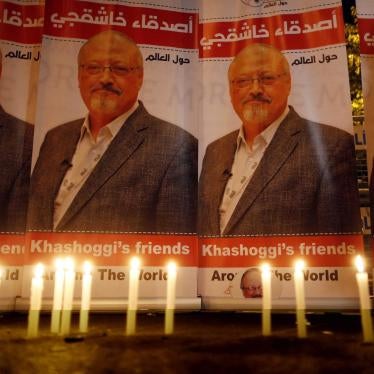March 14, 2019
Chairman Eliot Engel
House Foreign Affairs Committee
2462 Rayburn House Office Building
Washington, DC 20515
Ranking Member Michael McCaul
House Foreign Affairs Committee
2001 Rayburn House Office Building
Washington, DC 20515
Dear Chairman Engel and Ranking Member McCaul,
We, the undersigned organizations dedicated to the promotion and protection of universal human rights, write to commend you for your statements concerning the murder of Saudi journalist, Washington Post columnist, and Virginia resident Jamal Khashoggi, and to request that you continue to pursue accountability for this abhorrent crime as part of a larger re-assessment of the U.S.-Saudi relationship.
Specifically, we urge that you demand that the Trump administration provide appropriate members of Congress with the determination of responsibility for Mr. Khashoggi’s murder required under Section 1263(d) of the Global Magnitsky Human Rights Accountability Act of 2016, as well as relevant information documenting how the administration came to its determination. Given the administration’s demonstrated unwillingness to provide members of Congress with the determination required by the Global Magnitsky Act, or to supply information relevant to its decision-making in this matter, we further recommend that you consider holding hearings and/or issuing subpoenas to compel this information, in keeping with Congress’ constitutional oversight role. As you know, on October 2, 2018, a team of Saudi Arabian hit men are credibly alleged to have murdered Mr. Khashoggi after luring him into Saudi Arabia’s consulate in Istanbul, Turkey.
On December 4, 2018, following a classified briefing by CIA Director Gina Haspel, multiple Senators indicated publicly that the CIA’s findings constituted overwhelming evidence of Saudi Crown Prince Mohammed bin Salman’s (MBS) central role in Khashoggi’s murder, and on December 13, 2018, the Senate unanimously passed a non-binding resolution finding MBS “complicit” in Khashoggi’s murder on the basis of “evidence and analysis made available to this institution.” Separately, the United Nations’ Special Rapporteur on extrajudicial, summary or arbitrary executions stated, in early February 2019, that evidence collected during her trip to Turkey “demonstrates a prime facie case that Mr. Khashoggi was the victim of a brutal and premeditated killing, planned and perpetrated by officials of the State of Saudi Arabia.”
Nonetheless, the Trump administration has persisted in actions that can only be described as covering for the crimes of Saudi authorities. On October 10, 2018, a bipartisan group of 22 Senators, including the then-chairman and ranking member of the Senate Foreign Relations Committee (SFRC), triggered Section 1263(d) of the Global Magnitsky Act, which directed the President to report, by February 8, 2019, to that committee on those individuals—including the crown prince—that the U.S. government believes had a role in Mr. Khashoggi’s murder. We applaud Chairman Engel’s decision, in his role at the time as House Foreign Affairs Committee (HFAC) ranking member, to reinforce this determination requirement via a letter dated October 12, 2018, co-signed with then-HFAC Chairman Ed Royce.
On February 8, a senior administration official announced that President Trump refused to comply with the congressional mandate required by both the HFAC and SFRC. On the same day, Secretary of State Mike Pompeo issued a letter declining to address the determination requirement or offering any additional information concerning Mr. Khashoggi’s murder. These actions followed a written statement issued by President Trump in November 2018 in which the president pointedly equated Mohammed bin Salman’s denial of involvement in Mr. Khashoggi’s killing with the considered views of the U.S. intelligence community.
President Trump’s refusal to comply with the Global Magnitsky Act has rightfully garnered criticism from Democratic and Republican members of Congress in both the House and Senate. Among other reactions, we welcome Ranking Member McCaul’s statement of February 9, in which he said that he was:
“[D]eeply troubled by the letter I received from the Administration regarding the brutal murder of Washington Post columnist Jamal Khashoggi. The letter does not meet the requirements of the Global Magnitsky Human Rights Accountability Act… Everyone involved in this gruesome crime must be identified and held accountable. When the United States fails to lead, we compromise our integrity and abandon those pursuing justice around the world.”
In defending its refusal to comply with extant law and/or provide information related to Mr. Khashoggi’s murder, the administration has claimed that it is acting consistent with the constitutional separation of powers. Yet, as a trio of former U.S. Justice Department attorneys recently wrote, a president cannot elect to simply decline to accommodate congressional oversight.
Further, the administration’s refusal to respect Congress’ constitutionally-mandated role in overseeing foreign policy threatens both U.S. democracy and national security. One branch of government trying to obscure the truth from another on an issue of this magnitude subverts the will of American voters who elect members of Congress to be partners with—not subordinate to—the executive in the conduct of foreign policy. The administration’s position also sows doubt among America’s allies concerning its resolve to uphold universal human rights, while emboldening human rights violators like Iran eager to point to perceived hypocrisy.
Mr. Khashoggi’s premeditated killing violated many acceptable norms of human and state behavior. The murder’s authors clearly intended their crime to send a chilling message to Saudis at home and abroad: that those who peacefully criticize the government’s autocratic rule will never be safe, no matter where they flee. Saudi leaders apparently acted under the belief that they could issue this message without repercussion. For Mr. Khashoggi’s sake, and for the sake of human rights defenders the world over, Congress cannot allow this misguided belief to stand. Because the Trump administration will not defend the rights of the persecuted to speak without fear of assassination, Congress must.
We respectfully thank you for your consideration of this important matter.
Signed,
Americans for Democracy & Human Rights in Bahrain
Committee to Protect Journalists
Freedom House
Human Rights First
Human Rights Watch
Jacob Blaustein Institute for the Advancement of Human Rights
Open Society Justice Initiative
PEN America
Project on Middle East Democracy
Reporters Without Borders
Robert F. Kennedy Human Rights







